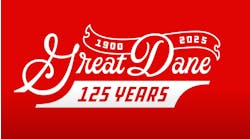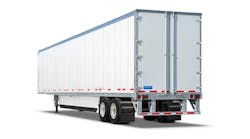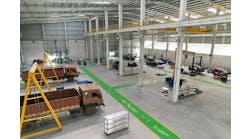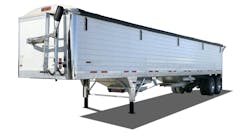President of Chicago Tube and Iron Company says manufacturers should recognize they are the key to economic recovery
AS Dr Don McNeeley surveys the American economic landscape, he doesn't like what he sees.
Not only is the manufacturing sector not getting credit for leading the country out of the Great Recession, but it's embarrassed by its down-and-dirty reputation and lack of sexiness.
“What greater legacy to leave is there than employment?” he said. “You're creating jobs. So when you go to a party and talk about the truck and trailer manufacturing business, or metal fabrication business, you don't find a lot of people coming up to you, going, ‘Oh, you're in trailer manufacturing!’ We're the ones creating the jobs.
“We're the ones leading this economy out of the recession.”
McNeeley is president and CEO of Chicago Tube and Iron Company, which was founded in 1914. The company is one of the largest steel service centers in the United States (with 10 subsidiaries throughout the Midwest), houses over 30,000 line items of inventory from some of the world's premier manufacturers, and has 96 years of consecutive profitability.
McNeeley also is a Northwestern University professor, teaches the capstone course in the graduate engineering program, and has a PhD grounded in Austrian economics and a discipline of ethical capitalism.
McNeeley said there is a big debate being waged at universities, where students are “indoctrinated with this brainwashing that says life is a continuum, and at one end are humanitarians and at the other end are capitalists. Humanitarians are ones that care about their fellow man and capitalists care about nothing but money.”
“Politics are turning this country upside down and ignoring the fundamentals that made this country great,” he said. “America puts out 25-30% of the world's output each and every year, and it's because our economic system centers on capitalism, where guys like you put your money at risk and work hard and build a product.
“There's got to be a reward at the end of that risk. When did we become the enemy? As an economist, I can tell you that historically you have an economic cycle: expansion, peak, contraction, trough. There's your recession. This trough continues to muddle along.
“Two hundred years ago, those economic cycles occurred at unbelievable regularity every seven years. Today, the economic cycle repeats itself with unbelievable regularity every four years. What occurs every four years? An election. There is a good probability that whatever you do this year — let's call it ‘X’ — 60% will be done in the first half of this year.”
It's the economy, stupid
He said Wall Street talks about attribution rate and standard deviation through an economic model. In other words, something happens. To what do we attribute that? He said 50% is the economy, 30% is the sector, and 20% is the company itself.
“If UPS stock goes up $10, $5 of that $10 the economy gave,” he said. “There's more shopping online over Christmas: $3 of $10 is the sector and only $2 is what the company itself is doing.
“The single largest determiner of your success or failure is the economy. It's the economy. The single largest factor is out of your control. So the agenda will be the economy and the government's role. If we look at the world economy, we are 25-30% of it. Let's go to the conservative side and say we're responsible for 25% of world output. The government is 25% of our GDP. So it has implications the world over.
“I could walk into your hotel or living room and watch the news you watch in the morning, and I could tell you with 92.3% probability what political party you're affiliated with. We even have news stations evolving to perform the role of meeting your constituency. An interesting thing is happening: What if we took away the 10% of the people who are far left and cut off the 10% of the people on the far right? The 80% who remain … don't you have the impression we're kind of all the same? But the media focuses on exceptions to the rules. Everybody's scared that the next generation is lazy, uneducated. We're all concerned. The impression you're getting from the media is the exception to the rule. Man bites dog is news. Dog bites man is not, because it's accepted.”
McNeeley said the government is based on a “we-the-people” process. In the old days, the butcher, baker, and candlestick-maker were part-time politicians. They'd close down their shops, get on their horses and ride to Washington, DC, to advocate for their constituency.
“Because there was no media, you would get back on your horse and report on your findings,” he said. “We no longer have a representative government, so people are getting lost in the shuffle.”
McNeeley doesn't like what he sees on the tax landscape.
“Each and every day, you get in your car and pull out of the driveway at 6 to go to work,” he said, “and one half of what you do that day is going to be confiscated from you and diverged to somebody that chose not to get up in the morning. What happens when they take more than half of what we do away and give it to somebody who chose not to get up?
“Now they're trying to increase taxes. In every economic model we put together at (Northwestern), it says that once you go over 50%, you're actually bringing in less revenue because more money moves underground and we become more aggressive in our tax returns. That $80 sent to the church turns into $800.
“Fifteen percent of US households make over $200,000, yet those 15% of households pay 50% of all taxes. Forty-six million Americas paid zero tax last year, and 49.2% of American households received a monthly check from the government. Where's the government getting it? From you.”
On either side
He doesn't like what he sees on the grassroots landscape.
“This Tea Party, we can make fun of it all we want but this is an organized revolution,” he said. “These are people who are well-funded, very intelligent, very well-coordinated. That group is growing. But now all of a sudden enters another group called Occupy Wall Street. Kind of a ragtag bunch. Not very well-organized, not very well-funded. When they first came out, it was an interesting study because they were anti-banking, and I was all for it. Two weeks later, they were anti-Wall Street. And then they were anti-government. And then anti-capitalism. Anti-capitalism? Capitalism is synonymous with success. If you're anti-capitalism, you're anti-success.”
McNeeley said the economy is being damaged by underemployment, with many workers taking $30,000 jobs after being laid off from their $60,000 jobs. With consumer spending accounting for 70% of GDP, that is not a promising scenario.
“Historically in the US, there have been only two ways to get out of a recession,” he said. “One is consumer spending, and it can't happen with the unemployment rate this high. The other option is exports.”
And that's not such a promising option right now.
“The European Union was in this great situation where it could supplant the US dollar as the world's currency,” he said. “At the precipice of the Euro taking over the dollar, Greece defaults, so the European Union gets together and says, ‘Let's bail them out.’ It makes sense on the surface but it invokes a world hazard — that's when you do something that on the surface looks great but has unintended consequences.
“Europe has a problem now, so we're not going to exit the recession on the backs of European exports. We're exiting it on the backs of manufacturing. People wrote us off. But we're leading this recovery. Think of the year you had last year. Think of the year you're having this year. Not a record, but you're doing OK.”
He said that whenever there is a world disaster, the US is the first country to come to the rescue by writing a check. He believes that no matter how big that check is, it's never big enough, and in the process, we are “selling out the next generation” and “backing ourselves into this corner.”
McNeeley doesn't like what he sees on the infrastructure landscape. He said an estimated $2.2 trillion of investment is needed in the next five years.
“We can't do that without trucks and trailers,” he said. “We can't even get to the construction site without trucks and trailers. This is a dynamic industry. So why have some made it so dull? Manufacturing is key.
Wal-Martization of America
Just how key is manufacturing?
“Thirty percent of all groceries are sold at Wal-Mart. The Wal-Martization of America is not the answer to the deterioration of manufacturing. Manufacturing jobs pay twice that. How can you replace $40,000-a-year manufacturing jobs with $20,000-a-year Wal-Mart jobs?
“How does a nation defend itself without a military? How do you have a military without an arsenal? How do you have an arsenal without the manufacturing sector? Are you going to subcontract the manufacturing of weapons to your eventual enemies? Somebody in Washington has to connect the dots.”
McNeeley is concerned about the decline in technical expertise. The US graduates 60,000 engineers a year, while India and China both graduate 600,000. Why is this? He said students in the United States are less inclined to pursue an engineering degree because of the extensive amount of mathematics involved in the curriculum.
But he believes there's something bigger behind the shift: competition is being legislated out of our lives, he said. In his area, for example, the Chicago public schools have outlawed dodgeball. And in many leagues, virtually everybody gets a trophy of some kind, regardless of how they perform as individuals or as a team.
Personal initiative also is waning as parents provide their children with canned activities.
“When you were growing up, there wasn't organized soccer,” he said. “You rode to Billy's house on your bike, and then to Frankie's house, and when you had enough, you went to the sandlot and had a game you organized yourself. We were the organizers and managers. We were in charge of our own destiny.”
And that's the world according to McNeeley.








